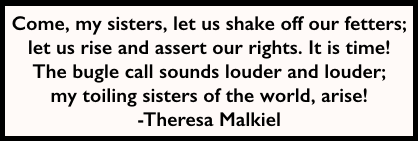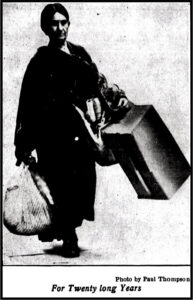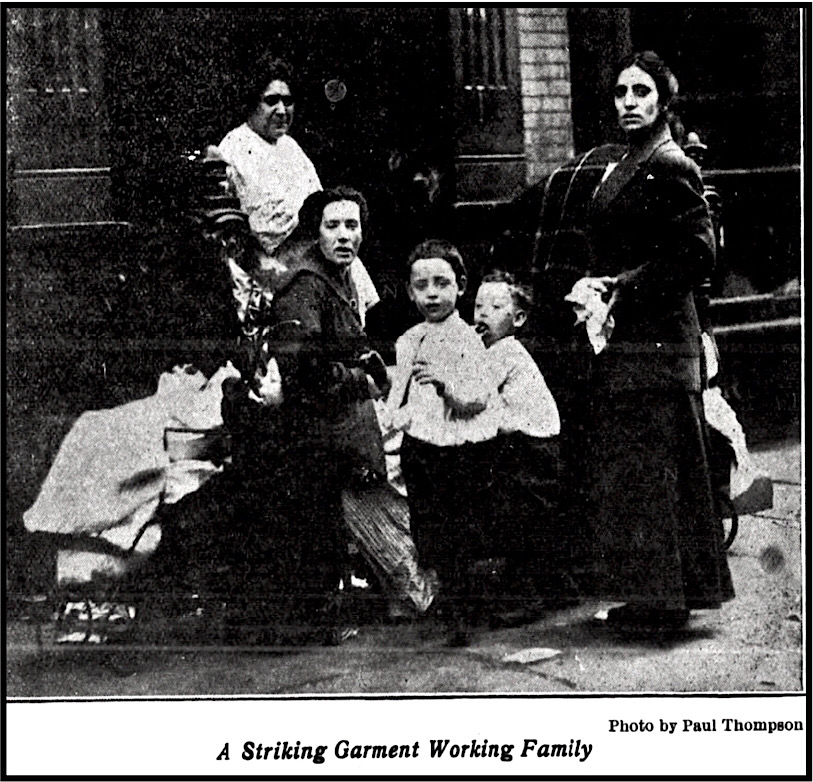 —————
—————
Hellraisers Journal – Saturday January 25, 1913
New York, New York – Theresa Malkiel on the Scene with Striking Garment Workers
From The Coming Nation of January 25, 1913:
Striking for the Right to Live
-by Theresa Malkiel
[Part I of III]
GRANDMOTHER! what are you doing here?” I asked of an old, old Italian woman who came up panting to the fourth floor of Clinton Hall. She turned around, looked me over with her black, penetrating eyes, which in spite of her age had not lost their luster and said:
“Me striker. Who you are?” I showed her my speaker’s card issued by the joint committee of the Socialist party and the United Hebrew Trades and she nodded her head in approval. I told her I was anxious to hear the story of the strike from the lips of the workers themselves.
“Me no speak much English,” she replied, “but me tella you just what me feel.”
She pulled up her gray, worn shawl which had slid down from her bent shoulders, smoothed her snow-white hair and slowly in broken English told me her tale of woe and suffering.
As she talked on I observed her closely and wondered what had kept up the fire and activity in that aged body, perhaps her very sorrow and unbelievable struggle for existence, for the revelations made by these aged lips sent a chill through me, filled my heart with horror. I knew that her case was not singular, that her condition was characteristic of the condition of all of her sisters in the trade and they constitute 60 per cent of the entire number of 15,000 women workers in men’s and children’s clothing industry.
She told me of twenty long years spent in the clothing workshops where the air is constantly surcharged with the foulest odors and laden with disease germs, she complained of the lack of sunlight of which she had so much in her own land. Here she had to spend her days working by artificial light. She complained of the long hours when work was plentiful, of the dread of slack time, of the small wages at best.
A bread winner for her own children in her younger days, when she first came to this country, she was now supporting two grand-children whose mother fell a victim to the ravages of consumption. Consumption invaded the old Italian woman’s family, as it had invaded the families of most of the clothing workers, carrying them off in the prime of life. The old woman was exceptionally strong, and she and the two small children she was supporting were the only survivors of the whole family.
These children, who are the apple of her eye, she keeps in a two-room flat of a rear eight-story tenement house located on East Houston street, the district where most of the clothing workers lived in order to be near their workshops, and where the population is recorded to be 1,108 to every acre. She pays $8 a month for rent and keeps two boarders to help pay it.
Strike for Love of Grandchildren
This woman who lacks only five years to the allotted three score and ten must finish 20 pair of pants, that is, sew on the lining, serge the seams, finish up the legs, sew on buttons and tack the buttonholes in order to make a dollar a day; $6 a week is the highest she ever makes in season. The season in the clothing industry lasts from March to June and from September to December. The old woman is no exception, to the rule, $6 per week, in fact, is above the average, many make less and very few more. They have no regular hours, but work as long as there is work, sometimes twelve, and fourteen hours a day.
It was not herself that the old Italian woman considered so much, as her poor orphan grand-children who had to take up the trade where she would leave it off.
“Why me strike you ask?” all the venom of the years of sorrow and wretchedness, all the bitter memory of her sacrificed children, cried out in her voice of defiance.
“Me strike because everybody strike, me all wanta live, me, too, lova me childs.”
“Union all right! me stick to union,” chimed in another worker.
“Me sick of the boss, me sick of work, me sick go hungry most time. Look!” and she showed me the little finger of her right hand. The bone was worn, the finger twisted into hook shape.
“Cotton, cotton, all the time, cotton I keep on this finger for 16 years, for 16 years me make buttonholes by hand. One hundred and fifty a day, when me want to make $1.25. Me work quick, quick like one steam engine. Me bite, bite, bite, look!” she opened her mouth. Her front teeth were completely worn out and decayed.
Teeth and Buttonholes
“You see, you no understand. Every buttonhole me make me must bite together with me teeth, me must do this quick, quick so look nice and no take too much time, me can no spare time when work is busy. My eyes they hurt, me can no see much now. Me sick, me tired, me can stand no longer, that’s why me all strike.“
I listened to her and thought of the billions of germs which are daily transmitted into our garments from the mouths of sick workers. A shiver went through my body, the fate of the Nation under these conditions was simply appalling, but the immediate surroundings were even more so, and my thoughts went back to the poor miserable garment workers, victims of greed and exploitation who, maimed, and distorted, and crippled had yet to drag on their miserable existence.
“She is perfectly right,” said a young Jewish girl. “There is no use, we simply had to strike, there was nothing else left for us to do. Look at me, I must finish 12 big coats in order to make a dollar a day, that is when work is plenty.”
“Nine cents, that’s what they pays us for finishing a whole coat, or overcoat sleeves, collar, buttons, lapels and all. I work like a slave and what have I from it? nothing. I am always in debt. When slack comes I must borrow to live on, the short season that’s really what is killing us. When the season starts in we work all the time day and night, we can’t earn much more than we need to live on and there are the old debts to pay. And those little bosses, the roaches as we call them, they simply skin us alive.”
Tailor by Inheritance
I left the group of women and walked over to a middle-aged Jew. You can find them all there; people of all nationalities, young and old, men and women, all spending their days and evenings devising means how to combat the enemy, making up future wage schedules, comparing union and nonunion conditions, thinking and talking of everything but their own hunger and suffering, that is, unless you bring out the conversation.
The Jew, whose long beard and care-worn face made him look much older than he really was, told me with pride that he was ‘a Schneider fon zu house’ which means that the tailoring industry was in the family for generations. Not here, in free America, but out there in darkest Russia, where he dealt directly with the customer and had no boss over him.
His wages averaged $10 a week which is the average wage for the male hand workers. He had four children and a wife to support on this sum. What wonder that the burden of the working class subjection, the persecution of his unfortunate race expressed itself in the sorrowful eyes, in the wrinkled forehead, the bowed shoulders? What wonder that he impressed me as though he had no more energy left to fight, that he was not the kind to stick.
AND yet he was ready to stay out to the end. He was used to it, he said. Last winter he was laid off for eighteen weeks. He managed to pull through, or rather starve through.
“Perhaps,” said he raising his eyes, “the good Lord will take mercy on his long abused children, the tailors, perhaps he will better their condition a bit, but they must help Him, they must strike, they must ask, they must demand.”
The very life-blood in his veins and in the veins of his fighting co-workers seems to be the heritage of bygone ancestors who thousands of years ago fled from slavery and bondage to a better land. The spirit of rebellion, the determination to fight which permeates the emancipated, exhausted Jewish tailors is simply wonderful and makes one think of the thousands of years of wandering and persecution and the Hebrew perseverance to seek ever better conditions to stand in the foreground of all revolutions for freedom.
[Emphasis added.]
~~~~~~~~~~~~~~~~~~~~~~~~~
SOURCES & IMAGES
Quote T Malkiel, Sisters Arise, Sc Woman p10, July 1908
https://www.marxists.org/history/usa/pubs/socialist-woman/080700-socialistwoman-v2w14.pdf
The Coming Nation
(Girard, Kansas)
-Jan 25, 1913
https://www.newspapers.com/image/487678638/
https://www.newspapers.com/image/487678654/
See also:
The Outlook
(New York, New York)
-Jan-Apr 1913
https://babel.hathitrust.org/cgi/pt?id=njp.32101075972636&view=2up&seq=11
(search: garment workers)
https://babel.hathitrust.org/cgi/pt/search?id=njp.32101075972636;q1=garment%20workers;sz=25;start=1;sort=seq;hl=true;page=search;seq=1;orient=0
The Survey
(New York, New York)
-Oct 1912-Mar 1913
https://babel.hathitrust.org/cgi/pt?id=hvd.32044015494909&view=page&seq=7
(search: garment workers)
https://babel.hathitrust.org/cgi/pt/search?id=hvd.32044015494909;q1=garment%20workers;sz=25;start=1;sort=seq;hl=true;page=search;seq=1;orient=0
Tag: Theresa Malkiel
https://weneverforget.org/tag/theresa-malkiel/
Tag: Paul Thompson
https://weneverforget.org/tag/paul-thompson/
United Hebrew Trades
https://en.wikipedia.org/wiki/United_Hebrew_Trades
Tag: United Hebrew Trades
https://weneverforget.org/tag/united-hebrew-trades/
Tag: New York Garment Workers Strike of 1913
https://weneverforget.org/tag/new-york-garment-workers-strike-of-1913/
~~~~~~~~~~~~~~~~~~~~~~~~~
Working Girl Blues – Hazel Dickens & Alice Gerrard


